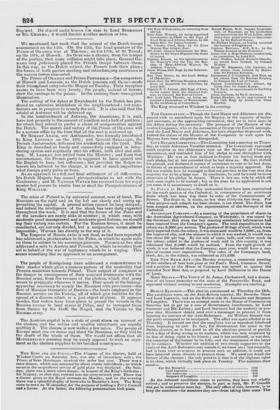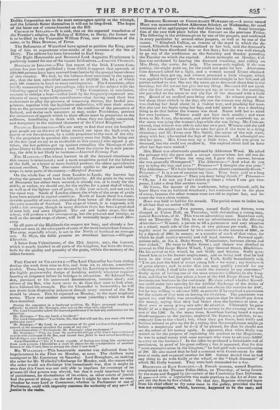DUBLIN ELECTION.—This election commenced on Thursday the 18th.. The candidates
were, on the Anti-Reform interest, Mr. Recorder Shaw and Lord Ingestrie, and on the Reform side Mr. Latouche and Sergeant O'Loughlen. There was an attempt made in the House of Commons on. Saturday last to get up a case of Government interference, by Lord Stormont and Mr. Lefroy ; and Lord Stormont had the modesty to pro- pose that Ministers should send over a messenger to prevent it from injuring the canvass of the Anti-Reformers. Sir William Gossett was the party attempted to be inculpated. The affair was again alluded to on Thursday. It turned out that the complaint was an impudent falsehood from beginning to end. In fact, the Government has acted in the Dublin election, as it has acted in all the elections general or partial, with a fear of doing wrong to its enemies, which was only surpassed by its fear of doing right to its friends ; and it has purchased, as was due, the contempt of the former by its folly, and the resentment of the latter by its coldness. Whether the addition of two sturdy supporters to the ranks of the Anti-Reformers may console it, we know not; but assuredly, had it been ever so anxious to procure such an addition, it could not have laboured more directly to procure them. We need not detail the history of the election : the only point in it that is of the slightest value is its close, which virtually took place on Tuesday. The.numbers then stood—
For the Recorder 1123 Lord Ingestrie 10i16
Mr. Latouche 848
Sergeant O'Loughlen 762 As the defeated candidates mean to petition, they have not wholly retired ; and to preserve the election, in part at least, Mr. P. Costello was put in nomination next day. The only effect of this, however, is to keep the members—for members they are—from taking their seats. The- Dublin Corporation are in the most extravagant spirits at the triumph, and the Liberals flatter themselves it will not be long-lived. The hopes of the latter are of course founded on the Bill.
CHURCH OF Inateem.—It is said, that on the expected translation of the Premier's relative, the Bishop of Killaloe, to Derry, the former see is to be filled by the Venerable William Price, now Archdeacon of the same, or by Dean Browne, of Ferns.
The Reformists of Waterford have agreed to petition the King, pray- ing of him to sequestrate nine-tenths of the revenues of the See of Derry. The address has been forwarded to Earl Grey.
The Right Honourable and Reverend Lord Augustus Fitzclarence is positively named for one of the Vacant Irishmitres.--Limeriek Chronicle.
DISTRESS IN IRELAND.—The last report of the Irish Distress Com- mittee has just been published ; from which it appears that upwards of
290,000 persons have been rescued from famine by the prompt benevolence of this country. We find, by the balance-sheet contained in the appen- dix, that the sum subscribed amounted to 50,9391. 19s. Id. ; of which only 501. remains in hand to meet contingencies. The Committee, after briefly enumerating their proceedings, take leave of the subject with the following appeal to the Legislature. "The Committee, in conclusion, venture to indulge a hope—called forth by the frequently-expressed sen-
timents of many respectable contributors—that having used their best endeavours to allay the pressure of temporary distress, the landed pro.
prietors, together with the legislative authorities, will turn their atten-
tion to the permanent improvement of the condition of the peasantry of Ireland, and devise such measures as may, under Providence, prevent
the recurrence of appeals which in their effects must be precarious to the sufferers, humiliating to those with whom they are locally connected, and derogatory to the national character of the United Kingdom."
Pommest. ETECTMENTS.—We are sorry to find that over six hundred poor people are on the eve of being turned out upon the high road, to starve or rob for existence, by a noble proprietor to the west of the city. To the proprietor in question this .country owes but little, he being one
of the few (and we say so as creditable to this county) who signed a pe- tition, the last petition got up against extending the blessings of reli- gious liberty to his countrymen ; and, from the course he is now pursu- ing, the debt is not likely to increase.—Limerick Evening Post.
THE HARVEST.—The wheat harvest in all the forward situations iu this county is terminated ; and a more auspicious period for the labours of the field, or a better or more fruitful produce, the oldest agriculturist cannot recollect. The same observation applies to the pea and barley crops in most parts of the county.—Hereford Journal.
On the whole line of road from London to Leeds, the harvest has during the present week been in full activity. All the grain to the south of Doncaster has either been secured; is already cut, or is ready for the
sickle, or rather, we should say, for the scythe, for a great deal of wheat, as well as of the lighter sort of grain, is this year moused, and not cut in
• the usual way. South of London almost the whole of the crops of grain have been secured in capital condition. North of Leeds there is a consi- derable quantity of corn cut, extending from hence all the distance into the corn counties of Scotland. The crops of wheat, it is supposed, will yield a fair average, though in many districts there has been a great deal
of corn laid, and some blighted. The oat and barley crops, like the -wheat, will produce a fair average crop, but the, potatoes and. turnips, as well as the second crops of clover, will be unusually large.—Leeds Mer- cury. In all parts of the Highlands the reapers are busy, and already a few stacks are seen in the corn-yards of some of the more industrious farmers. The crop, especially wheat, is not in the North of Scotland an average one. In Skye, the fields promise an abundant harvest.—Glasyow Chronicle.
A letter from Valenciennes, of the 17th August, says, the harvest, which is nearly finished in all parts of the kingdom, has been the finest, both for the quality and quantity of the grain, within the memory of the oldest farmers.



























 Previous page
Previous page